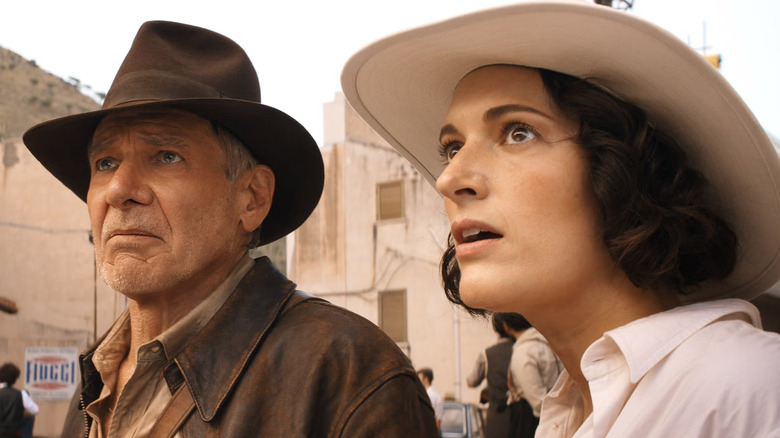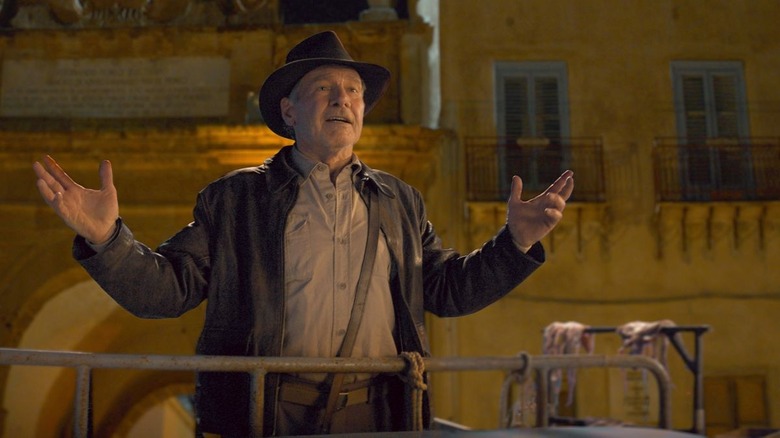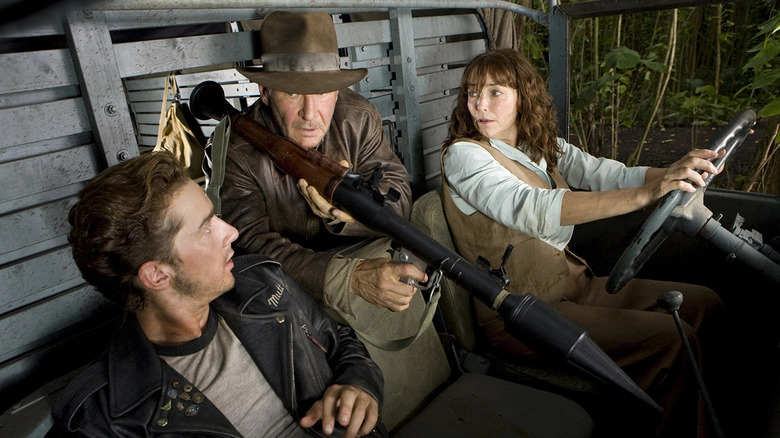Changing Indiana Jones And The Dial Of Destiny's Big Ending Was Never An Option
This post contains spoilers for "Indiana Jones and the Dial of Destiny."
By the time we got to the final act of "Indiana Jones and The Last Crusade," the pattern of these movies had become clear: whereas the first two acts of the film would be relatively grounded in reality, the third act is when things take a turn towards the supernatural. That's when the magical artifact that's widely suspected to be filled with genuine magic is revealed to be exactly that — the Ark of the Covenant starts melting people's faces, just as the Holy Grail turns out to not just be real, but is guarded by an immortal knight just as the legends said. People criticized the alien stuff in the final act of "Crystal Skull," and while it certainly could've executed better, the general idea was still pretty much in line with what the original three movies established.
"Indiana Jones and the Dial of Destiny" follows the fourth movie's strategy of arguably going too far in its final act. Not only does the dial work, but Indiana ends up going back in time to 212 BC and talking to Archimedes. Even in a franchise where people can gets their hearts grabbed out of their chests through dark magic, this still feels a little hard to swallow. Whereas the other movies maintained a sense of mystery around their objects, there is something almost disappointingly straightforward about the dial in this film, and a lot of mystery is lost by having us literally meet the man who made it.
But as controversial as this all has proven to be, director James Mangold has made it clear that it was never going to end any other way. When asked in a recent interview if he'd considered any alternatives, he responded, "This is the ending we wrote two years ago, and no."
Behind the thought process
"When you start writing anything, you don't know exactly how you're going to land it. You just keep working," Mangold explained. "And there were moments where I thought about, I thought maybe they're going to end up going back to Germany and he'll stop Mads from doing what he's doing, but I felt like we already did that with the opening." It's easy to see his point here; not only would this development be repetitive, but it's lacking in that sense of ironic cosmic comeuppance this franchise is so good at delivering to its villains. Their thirst for power needs to backfire on them somehow, and having the bad guy land over 2,000 years before his intended destination is right in line with that.
The other big, potentially divisive moment in the movie's finale is when Indie declares he wants to stay in the past, even if that means dying from a gunshot wound that could easily been treated with modern medicine. "Dial of Destiny" resolves this not with Indiana choosing to return to the present, but with Helena (Phoebe Waller-Bridge) knocking him out and dragging him back to the present against his will. It's a moment that seemingly denies Indy his agency, as well as what seems like a fairly poetic, fitting end for the character. But for Mangold, leaving him behind was never an option:
"It seemed to me it would have been a kind of suicide by time warp and kind of grim. Like, is he really going to be happy? Even Phoebe says, with leeches and blah blah blah, watching people haul dung around in carts and slaves? No... The whole thing seems more like the impulse of a guy who doesn't know what he would be going home for."
Giving him something to come back to
In the end, Indiana Jones' character arc in this film is about finding something to come home for. That's why Helena doesn't just bring him back home; she also invites Marion back over and leaves Indie the dial. Indiana can return to the past to die there if he still wants to, but considering his reconnection with Marion in the film's final moments, it doesn't seem like he'll still want to make that choice. After years of misery in the wake of his son Mutt's death and the subsequent unraveling of his marriage, "Dial of Destiny" ends with Indiana getting his family back.
"For me, the end of a movie like this is not 'the plot gets resolved.' Often in movies, there's a place where what's been driving the plot forward's been resolved, but then there's an emotional thing that needs to get resolved," Mangold said. "And I find too often in movies, we just focus on the plot. We resolve the nefarious character who is going to destroy the world or whatever. But where does this land on our heroes? What is the effect of all this?"
Sure enough, the effect is that Helena learns to value morals and friendship over money, and Indiana gets his second (well, third) chance at a happy life with Marion. There's nothing like an absurd otherworldly experience to remind these characters to embrace the meaningful connections they've made in their own worlds, even if those connections have painful aspects to them. Viewers may still have their gripes about the over-the-top nature of this movie's finale, but when it comes to making it all feel meaningful for its two main characters, Mangold nails it.


